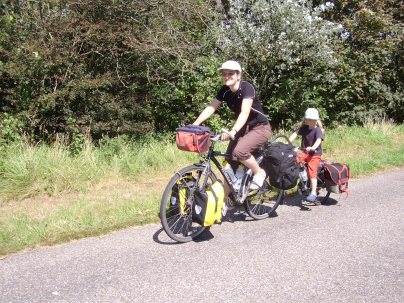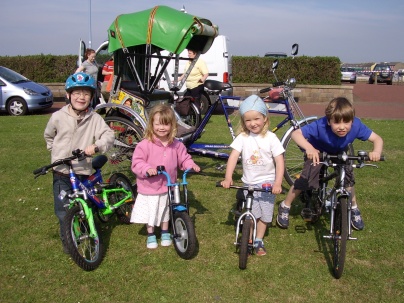I’m just back from the 10th annual Cycling & Society Symposium, hosted this year by the University of Central Lancashire at their outdoor campus, Ty’n Dwr, near Llangollen in mid-Wales. It was superbly organised by Richard Weston, and pulled together around 35 of us face-to-face, as well as Jennifer Bonham in Adelaide, Australia via Skype.
As someone who’s been around since the start, I was invited to say a few words about where as a research community we’ve come from, where we might go, and how in the wider world cycling is changing. I decided to start by telling the cycling story of my daughter, Flo, who like Cycling & Society is 10 years old.
Flo was born into a bubble structured by cycling; her parents love cycling and live without a car. For a decade she has developed through that structured space, into a skilled and experienced cyclist. At the start she had to be physically carried or pulled …
But she soon learnt to propel herself, initially on a balance bike, then through a series of pedal-driven machines; the bikes grew bigger and she became stronger, faster and more independent.
For so long as her friends were the children of our friends, cycling remained normal. But then slowly, inevitably, she has through school developed friends of her own, friends whose lives are not based around the bicycle but the car. And cycling is steadily becoming less ‘natural’; it’s becoming more unappealing. We’ve taught Flo to cycle, but it’s getting steadily harder to make her cycle in a world which mainly doesn’t. Her agency is being structured less by us her parents, and more by the world outside. For now she’s riding slowly away from us, towards the car. Her transport preferences are becoming normal. In her own little, sweet and innocent way, Flo shows how far we remain from a cycling world.
The personal and the social are inextricably, complexly connected. I struggle with but also accept Flo’s resistance to cycling; she’s finding her way in the world, and wants to fit in. We’ve helped her – and some of her friends – to understand more about cycling, but they’re all part of a car-centric society in which ‘being normal’ matters. In the world as it is her reluctance to cycle is part of learning to be sociable. So our challenge as parents is changing; if over the last decade we’ve taught and encouraged our kids to cycle, over the next one I hope we’ll teach them to navigate and negotiate a world of multiple and sometimes clashing visions and values – in other words, politics. We’ll explain cycling’s significance to a healthy, peaceful, happy, just, and green world, and we’ll try to nudge them some ways more than others, but they’ll figure things out for themselves, including what role cycling, if any, should play in their own lives.
But this next decade is crucial, either to cycling’s continued marginalisation or else to its normalisation. A decade ago cycling was ignored and/or treated as irrelevant by most academics, including those with expertise in transport and sustainability; today, in contrast, there’s a steady stream of peer-reviewed journal articles about cycling, major research funding for cycling projects, and more respect shown to those who argue for cycling’s importance. Cycling’s shift from the margins towards the mainstream of academia is an effect but also a cause of cycling’s shift from the margins towards the mainstream of society in general; both trends are tentative but have the potential to develop significantly between now and 2023. So I look forward to the 20th Cycling & Society Symposium in 2023, and hope I might have good news to report there on Flo’s cycling trajectory over the coming decade, as she moves into adulthood. By then cycling could be much more normal, and Flo and her friends might perhaps be cycling, and less self-consciously.
Llangollen was a cosmopolitan affair. There were people from Brazil, China, Poland, Romania, Denmark, France, Portugal, Italy, Ireland, the Netherlands, Spain, Hungary and the UK, as well as Jennifer from Australia. I find this truly inspiring and encouraging – the thirst for new cycling knowledge, like the push for cycling, is now happening almost everywhere.
The beautiful, rural and remote location provided good opportunities for riding. Many participants got out and about by bike during the event; for myself, I rode over to Llangollen from Crewe with Tim Jones (above) – who gave a super presentation about the MAMIL (Middle Aged Men in Lycra) phenomenon – and Cosmin Popan (below) – who’s recently started a PhD on cycling at Lancaster University. And after a full day spent listening to twelve diverse but uniformly excellent papers, the three of us rode with Peter Wood – who’s close to finishing his PhD on cycling at The Open University – up Horseshoe Pass.
It’s a huge privilege to hang out with researchers such as Peter and Cosmin who, compared to Tim and me, are starting out on their journeys into cycling research. The energies and enthusiasms of others who love cycling are infectious. And there’s still so much to know, both about cycling per se, and about how best to promote it.
Seeing in Llangollen the continuing passion for and growing expertise in cycling, it strikes me that thinking about cycling is in a pretty healthy place, and that it’ll continue to make important contributions over the next decade.

























